The kind of long narrative of serialized TV can be wonderfully immersive, but here at 25YL we also recognize the value of a great standalone episode. Join us as we explore horror and sci-fi anthologies old and new, along with some other standout episodes of shows you love. This week, Natasha B.C. Smith looks at an episode of Angel: “Are You Now or Have You Ever Been”
“Are You Now or Have You Ever Been” is an almost self-contained Angel episode, set primarily in the 1950s. Written by Tim Minear and directed by David Semel, the second episode of Angel’s second season is a truly dark meditation on the human condition. This episode makes you look inwards at yourself, the things you’ve done, the things you’ve neglected to do, and the things that have been done to you. It makes you think of those who’ve hurt you, those you admire, and those lurking around the corner who would do harm to others. It makes you contemplate the state of the world, and of humanity. It has no easy answers.
At the start of the episode, Angel has Wesley and Cordelia research an L.A. hotel, the Hyperion, which was plagued with murders and suicides from its construction in the 1920s until it closed in the 1970s—after the concierge went on a shooting spree from room to room. It’s now abandoned, a protected historical landmark that no one wants.
Cut to 1952, when Angel was living in the Hyperion. Everyone there has something to hide, and who can blame them—racism and homophobia are rampant, and McCarthyism is encouraging Hollywood’s elite to turn on each other over connections to Communism. Angel keeps to himself and drinks bottled human blood in the privacy of his room, observing the happenings around him but never getting involved. He is forced to, when a young woman, Judy, shows up in his room and begs him to hide her from her “boyfriend” (really a PI). Reluctantly, Angel beats up the PI and chases him off. Later, Judy thanks Angel for helping her.
A salesman commits suicide in the hotel, and the manager fears the hotel could be shut down, since it’s the third suicide in three months. The manager decides to cover the suicide up, and orders a bellhop to store the body in the meat locker. The news gets out anyway. The hotel guests start to suspect that perhaps it wasn’t suicide, but murder. As the closeted gay movie star, possibly Communist screenwriter and others start to freak out about the possibility of the police and the press snooping around, they grow defensive and start blaming each other for the murder (in the present day, we find out that the bellhop was eventually executed for the crime).
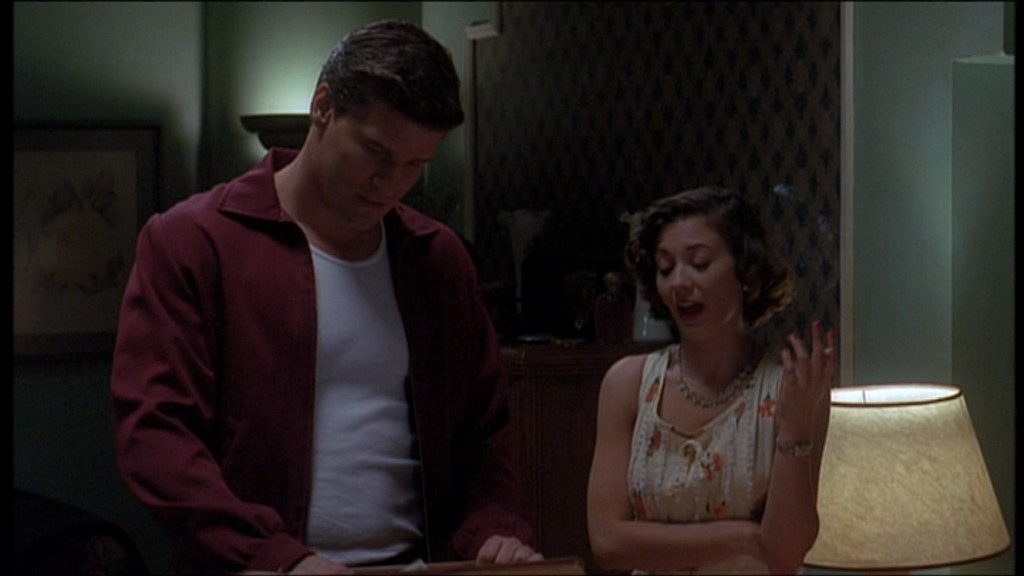
Judy confesses to Angel that the PI is after her because she stole a large amount of money from her former employer, a bank. They fired her when they found out she was mixed race (she’s been passing for white since she was 15), and when her fiancé found out why she was fired, he broke up with her too. Angel can relate to her feelings of not being one thing or the other, and he helps her hide the money.
Angel discovers that a paranoia demon called a Thesulac has been living in the hotel, whispering to its residents to bring out their innate insecurities, and feeding on their paranoia. Angel gathers supplies to stop the demon. When he returns to the hotel, he finds a mob surrounding Judy, blaming her for the murder, since the PI has come back and revealed her past.
Angel makes eye contact with Judy and starts moving forward to help her, while the mob continues to badger her, until she suddenly points to Angel and exclaims, “It was him! Look in his room, go ahead, look, he’s got blood, he’s a monster!” The mob beat Angel to the ground, as Judy watches, crying. In a disturbing and chaotic scene, they string up a noose and hang Angel from the balcony. A silence settles over them as they realize what they’ve done, and they start to drift away.
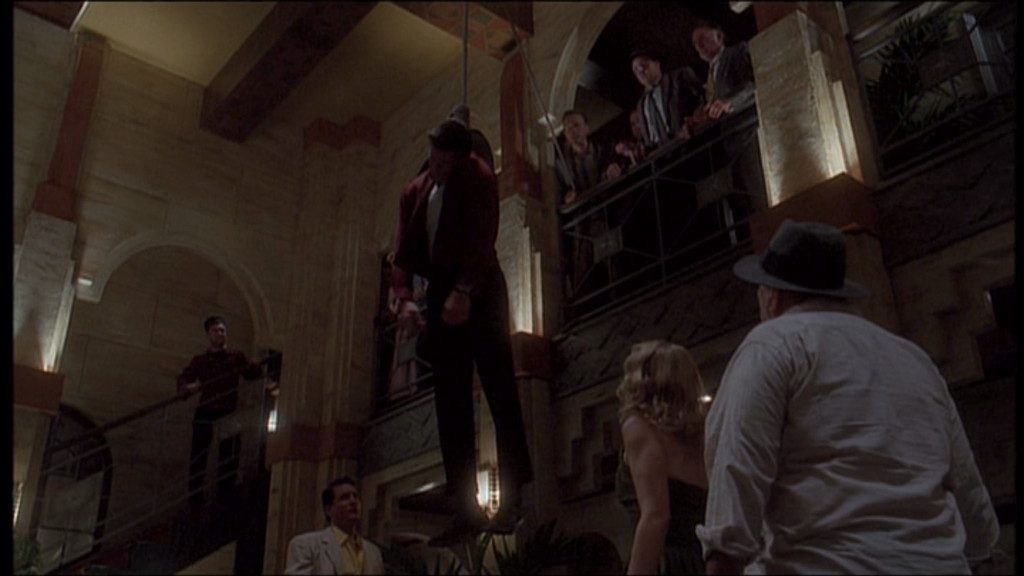
Once everyone is gone, Angel opens his eyes and lets himself down. The Thesulac demon appears to him and points out that there’s an entire hotel full of people who could really use his help. Without looking back, Angel replies, “Take them all,” and walks out of the door.
In the present day, Angel discovers that the Thesulac demon is still at the hotel, and that he’s been keeping Judy there and feeding on her paranoia for the last 48 years. With the help of Wesley, Cordelia and Gunn, Angel kills the demon. He finds Judy, now an old woman. She apologizes for killing him and asks if he can forgive her. He does, and she passes away peacefully.
Angel tells his team that they’re moving into the hotel (since their previous base of operations recently exploded). They’re horrified, and Wesley claims that the hotel is a house of evil. With a smile and a look around, Angel replies, “Not anymore.”
There is a lot to unpack in this episode, undoubtedly one of the series’ best. It’s easy to relate to if you’ve ever been personally betrayed by a friend for their own gain. You know that it’s unnecessary, that you could have worked together to fight against the real enemy, if only they hadn’t betrayed you. It’s the coworker who stabs you in the back to avoid the wrath of an asshole boss; the school friend who sides with your bullies to improve their own social standing; the McCarthy-era professionals turning in respected colleagues to escape being associated with Communists; Judy letting Angel get lynched just to take the heat off of her; the Trump supporter who sympathizes with illegal immigrants, but turns their neighbors over to ICE because everyone has to obey the law.
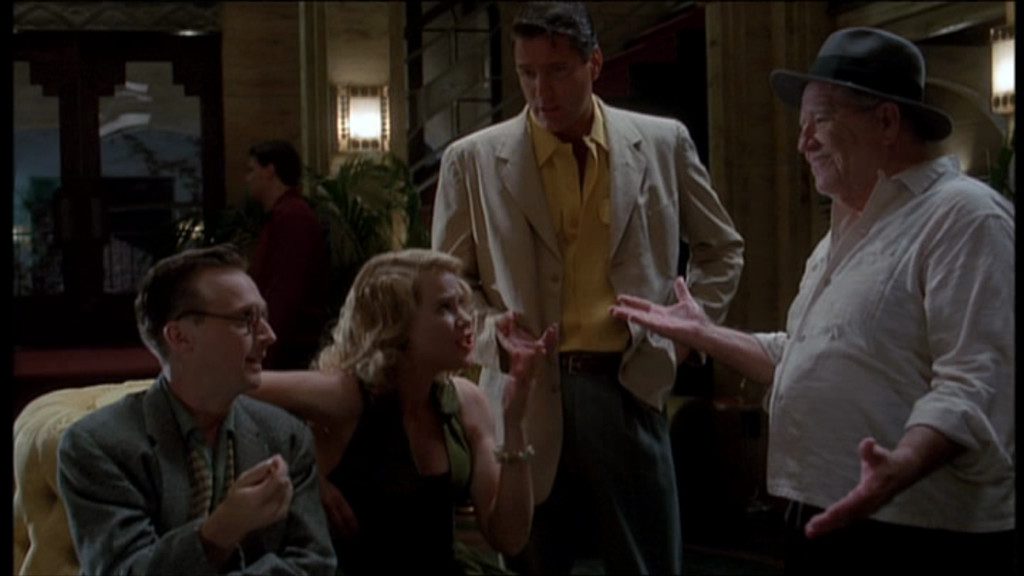
When “Are You Now or Have You Ever Been” first aired 19 years ago, in a pre-9/11 world, it felt like a slice of history. It was still relevant, sure, because everyone can relate to being betrayed, because discrimination obviously still existed, and because McCarthyism will always be important to remember. But it didn’t feel like the episode was drawing on any specific current events. Weirdly, 19 years later it feels like an incisive and scarily accurate commentary on the state of the world. In the last 19 years our society has somehow regressed to reflect a discrimination-fueled 1950s-era murder hotel controlled by a malevolent paranoia demon that feeds on hatred. People say that The Simpsons predicts the future. Angel predicted the future, in an episode set in 1952 and made in 2000. How the fuck did this happen to us?
Over and over again, those in power sow fear and paranoia to turn the 99% against each other. Soon people give in to prejudice and attack others who have done nothing wrong—who are not their enemy. They betray us instead of banding together to fight the real bad guy—the Thesulac-demon-in-chief, the 1% maintaining control, keeping all of us from fair wages, from the right to healthcare, from recourse against catastrophic climate change.
Some will always stand up to evil, no matter the cost. My own grandfather lost his job as a New York City college professor during the McCarthy era, because he refused to name names. I’m proud to be his granddaughter, but sometimes it can be tough to take a stand, or to even know how to help, especially when we are struggling with our own demons.
Before Angel meets Judy, he is stuck in self-imposed isolation. He witnesses life, but doesn’t participate in it. This is at a point in his story long after he regained his soul, but long before Buffy was around to reconnect him to humanity. He’s no longer part of the vampire world, but he doesn’t feel he can be part of the human world either. His position is strikingly relatable to those of us who have struggled with depression, anxiety or other forms of mental illness. He feels unable to connect, and he’s given up even trying. Whether living in a demon-filled world like Angel’s, or a worryingly divided country like today’s America, it can be hard to find the strength to help anyone else when we can barely find the strength to help ourselves.
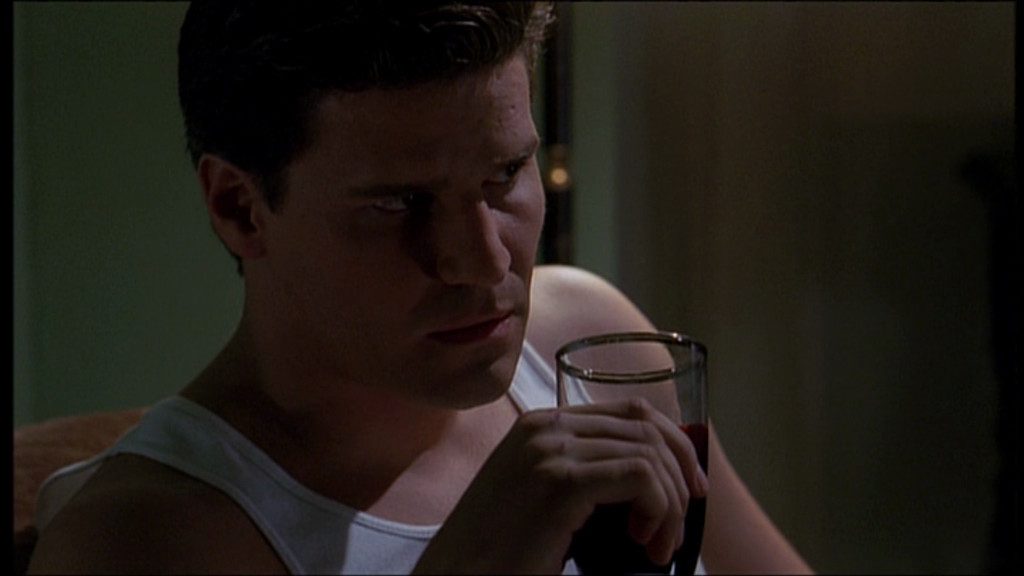
The isolation is bad, but it feels safe. Especially when the voices of depression and anxiety constantly fill your thoughts with paranoia, just like the Thesulac does. Judy’s betrayal, of course, only drives Angel even further into isolation. However, by the end of the episode, when we return to the present day, we are reminded that Angel has finally found a handful of friends whom he can trust. They would never betray him like Judy did. They will stand with him and fight against the bad guy, knowing that they’re stronger together.
The Thesulac demon may be the true bad guy of the episode, but “Are You Now or Have You Ever Been” is full of moral complexities, intriguing to consider and impossible to untangle. As well as paranoia and betrayal, the episode explores themes of vengeance, blame, and forgiveness. In the end, Angel does forgive Judy for what she did to him. But only after 48 years. Only after having left her and a hotel full of people at the Thesulac demon’s mercy—Judy kept prisoner in her hotel room, the bellhop executed for a murder he didn’t commit, all those people killed by the concierge who decided one morning to go on a shooting spree through the hotel. Can Angel be forgiven for this? Were his actions justified? These questions are left unanswered for us to contemplate.
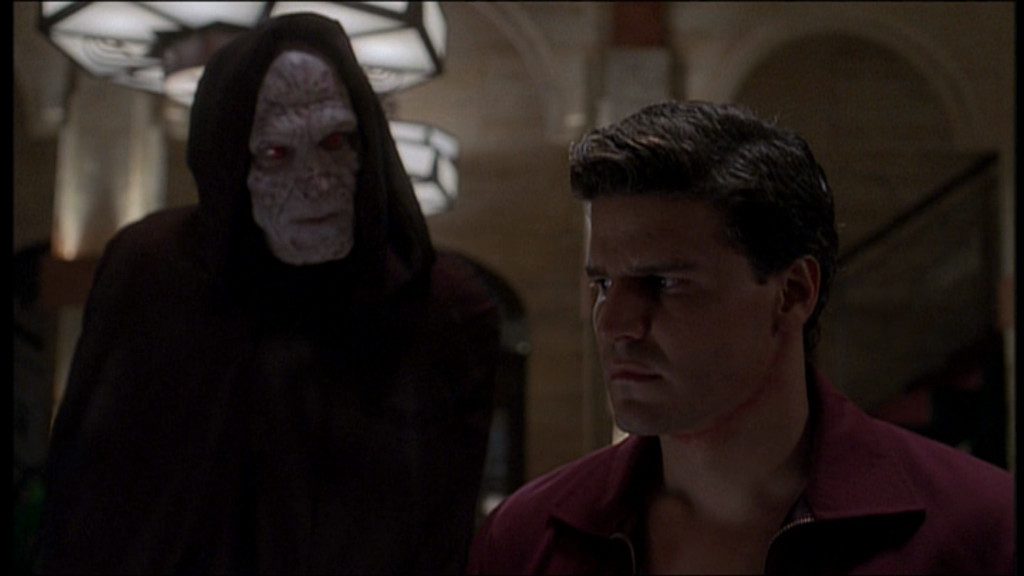
What about Judy? Was she justified in stealing all that money from an employer who discriminated against her based on her race, essentially ruining her life? Was she justified in turning against Angel to save herself, when a lifetime of unfair prejudice from everyone around her culminated in her being blamed for a murder she didn’t commit? If Angel hadn’t shown up, would she have been the one lynched? The thing is, Angel was the only one who didn’t discriminate against her. He wanted to help her, and he could have. They could have helped each other and been okay, but she chose to betray him instead.
Then again, Angel did have blood in his room. He was, technically, a monster. In the past he’d killed countless people and committed unspeakable acts as Angelus. So, was Judy in some way right in turning him over to mob justice, to be hanged for murder (though not one of the ones he’d actually committed)? Even though when he committed those acts, he didn’t have a soul, but he’d since regained it and become a different person?
In Angel and Judy’s encounters with the PI, the PI is framed as the bad guy. Perhaps he is aware of Judy’s background and acting partly out of racism, but he’s essentially trying to find someone who stole a huge amount of money from a bank. Is he a bad guy for doing this? Or are Judy and Angel the bad guys for hiding from and resisting him? After all, she’s a thief, and he’s a blood-drinking monster who has murdered countless people. Perspective is important.
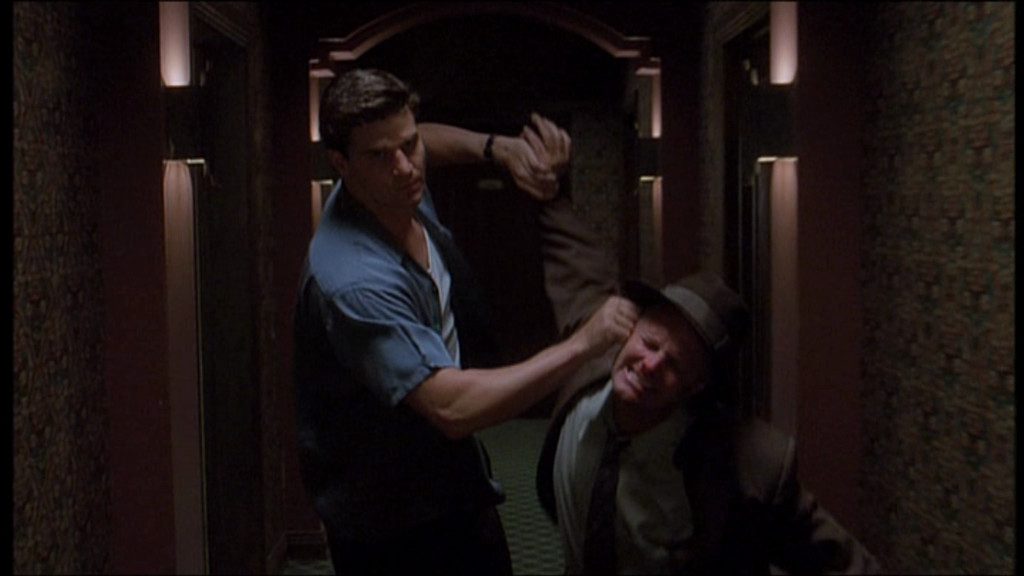
The episode continues to ask these questions. Who deserves forgiveness? Who deserves vengeance? How do people justify the immoral acts they commit? Are they correct in their justifications? Can this seemingly unending cycle of humans perpetuating cruelty and betrayal ever be stopped? How? In reality one paranoia demon is defeated and another takes its place. People do bad things, but think they’re doing them for the right reasons. Other people simply react against them, without trying to understand their point of view. The truth is, some things can be forgiven, but some can’t, and each of us has to decide where that line is for ourselves. However, even if someone has done things you can’t forgive, perhaps there is still some value in trying to understand why. Not to excuse their behavior, but to try to stop the cycle from repeating.
While “Are You Now or Have You Ever Been” deals with themes that can be applied to the wider world, it’s still steeped in the very specific history of Los Angeles. McCarthyism was intensely focused on the Hollywood film industry. A scene where Angel runs into Judy at Griffith Observatory pays homage to Rebel Without a Cause. Then there’s the hotel itself.
The exteriors of the Hyperion Hotel were shot at Los Altos Apartments on Wilshire Boulevard. Like the fictional Hyperion, the real building was constructed in the 1920s and is now a protected historical landmark. Also like the Hyperion, Los Altos Apartments has served as both a residence and a hotel over the years. The building has been host to a wide array of actors, screenwriters and other notable people, including Bette Davis, Mae West and William Randolph Hearst. However, that’s about where the similarities end. For the Hyperion’s sordid history, you have to look elsewhere in L.A.
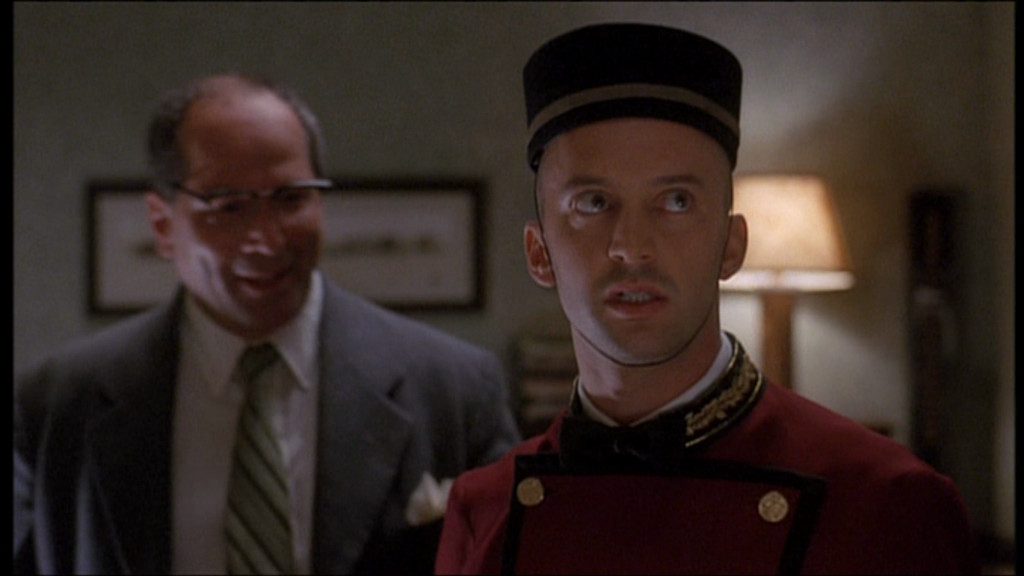
Though there are several historic hotels in L.A. with fascinating histories, the Hyperion is most likely inspired by the Cecil (otherwise known as Hotel Cecil and more recently Stay on Main), located on Main Street in Downtown Los Angeles. Over the years, the Cecil has been the site of several suicides, murders and accidents, has served as a residence for two serial killers, and was one of the last places the Black Dahlia was rumored to be seen before her murder.
It brings out a morbid fascination when murders, suicides and accidents seem to congregate in one place, but it’s easy to forget that these things happen every day, spread out over the world. Having said that, some places do seem to attract outcasts, whether it’s coincidental or there’s a reason for it, and the Cecil’s history does seem to be peopled by those who were forgotten by society or else had something to hide. At least two of the real people who committed suicide at the Cecil reportedly checked in under fake names. It’s interesting to note that in “Are You Now or Have You Ever Been” Judy also checked in under a fake name, and there is no evidence that anyone at the hotel, Judy included, knows Angel by any name at all.
The Hyperion functions as a microcosm of Angel’s wider world, full of demons and Hellmouths, and perhaps the Cecil functions as a real-life microcosm of our wider world, full of people struggling to get through the day, with some of them inevitably falling through the cracks.
Possibly the most well-known death to take place at the Cecil was that of Elisa Lam, ruled to be an accident influenced by her bipolar disorder (it’s likely that she was experiencing a manic episode when she died). After she went missing, the last known video footage of her was released, which showed her getting in and out of one of the Cecil’s elevators, pushing buttons over and over to try to get the elevator to move, and stepping out of the elevator, where it looks like she’s talking to someone who either can’t be seen in the frame or isn’t really there (this led to speculation that she was either murdered or that something supernatural occurred, but it seems most likely that she was hallucinating). Three weeks after she went missing, many of the Cecil’s guests complained of discolored water with a strange taste and smell, and when someone went to investigate, Elisa Lam’s body was discovered in the rooftop water tank.

There are a few parallels to Elisa Lam’s death in “Are You Now or Have You Ever Been”. Firstly, of course, the Hyperion is likely based on the Cecil. Most notable though is a scene where Angel sees the salesman talking to someone, but it appears that no one is there. From where Angel is standing, he can’t quite see past a wall into the hallway where the salesman is facing, so while it’s almost certain that no one is really there, it’s impossible to be sure. The salesman is standing in basically the same position relative to Angel as Elisa Lam is standing relative to the camera in the elevator footage of her. She’s also seemingly talking to someone, but it appears that no one is there, and from where the camera is positioned, we can’t quite see past a wall into the hallway where she’s facing, so while it’s almost certain that no one is really there, it’s impossible to be sure.
The salesman later commits suicide, due to the influence of the paranoia demon. Elisa Lam later went up to the water tank and died, likely due to the influence of hallucinations—and paranoia—caused by her mental illness. There’s an earlier scene in “Are You Now or Have You Ever Been” where the bellhop, terrified of Angel, stands in the elevator pressing a button over and over while he waits for the door to close—again echoing the footage of Elisa Lam. There is also the debate during the episode over whether the salesman’s death was a suicide or a murder, while it was technically caused by a supernatural being. While largely settled now, there was also substantial debate over whether Elisa Lam’s death was a suicide or a murder—or caused by something supernatural. Even the fact that the salesman’s body was stored in the Hyperion’s meat locker, where it can be assumed food for the hotel guests was generally kept, echoes the fact that Elisa Lam’s body was found in the Cecil’s water tank, contaminating the water that the hotel guests were drinking.
However, unlike the other deaths at the Cecil which likely inspired this episode, the death of Elisa Lam occurred in 2013—13 years after the episode was made. While all of the similarities are obviously just coincidences, they are fairly eerie, especially given the fact that a 2005 horror film, Dark Water, has also been said to have predicted many of the circumstances of Elisa Lam’s death. Aside from all of this, the strange similarities in “Are You Now or Have You Ever Been” to the death of Elisa Lam further add to the feeling that the episode could have been made today, and that it somehow manages to be much more relevant to the state of the world in 2019 than it was to the state of the world in 2000, when it was actually made.

One of the major themes of Angel is redemption, but the show never really states whether that redemption is possible. At the end of “Are You Now or Have You Ever Been” Angel seems to see himself in the Hyperion, something that was once evil, but isn’t anymore, and he decides to put it to good use as their new base of operations. Perhaps, like the Hyperion, the United States itself can still become something better than the divided and broken country it seems to be now. I won’t say it can be redeemed, because the children suffering abuse in concentration camps will still be traumatized, the victims of mass shootings will still be dead, and the country will still have been built on slavery, genocide, and racism.
Redemption isn’t necessarily the point though. Another major theme of Angel is that what really matters is to just keep fighting, to keep trying to make things better on whatever level, to whatever extent you can. Even if the bad seems like it’s winning. Even if you can never be redeemed. Keep trying to shift the scales, to add to the good, even just a little bit. Maybe it’s not enough, but if it’s all you can do, at least it’s something. Just keep fighting, against the evil and the paranoia, against the prejudice and hate, whether it’s in yourself or in someone else. In this episode, made 19 years ago, and in our lives right now in 2019, this seems especially relevant.

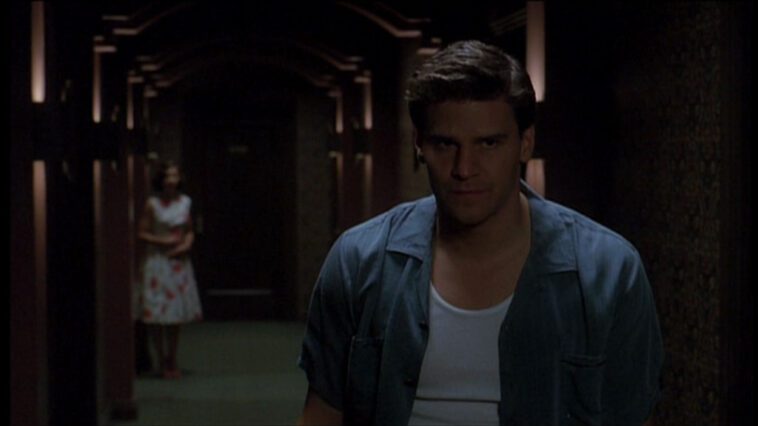
Wow, I’d never before known about the coincidence of this Angel episode with the Elisa Lam case. Given the number of coincidences in the Lam case, it is even stranger.
There cannot be echoes of Elisa Lam’s death in this because she died in 2013.
The episode may be a predictor or precursor, if you will, but the episode was filmed over a decade before her tragic death.
There cannot be echoes of Elisa Lam’s death in this because she died in 2013.
The episode may be a predictor or precursor, if you will, but the episode was filmed over a decade before her tragic death.
Never mind, I misread the dates. You addressed the time lapse in the article. Kindly ignore above post.
The thing I loved about this episode were all the nods to FOREVER KNIGHT, including the polka music, the actor who played Nick Knight’s partner Schanke, John Kapelos. The hanging scene with Angel wearing the identical boots to the ones Nick Knight wore when he was hanged was wonderful to see. Angel drives a similar car to Knight, he dresses the same, wears a similar flowing coat and lives in LA where Knight started out. There are many more references and homages to FOREVER KNIGHT in this episode. It’s like coming home again.
The author is not wrong about this prediction of the future, although it’s only coincidence that makes it appear so. This is a representation of a specific period in US history when communists were demonized for political purposes.
Since Roy Cohn, Senator Joseph McCarthy’s lawyer at the time the communist witch hunt was ongoing was Donald Trump’s lawyer for decades, Trump learned sleaze from him. It’s no surprise he’s following the witch hunt playbook of McCarthy and Cohn.
Cohn’s been called Trump’s mentor amd “thoroughly evil” Roy Cohn. Trump learned at his knee how to lie, cheat, steal and
do the maximum amount of harm in order to get his way. Seeing the similarities between the situations is accurate. It’s valid, even, if you’ll allow the psychobabble term.
So the common denominator is Attorney Roy Cohn. He created Sen Joe McCarthy and then worked for Trump’s father Fred Sr. Cohn then spent decades with Donald Trump. It’s the same situation being created for the same purpose: terrorizing people to control their minds for power. It is despicable.
There’s a massive plot hole in this one that bugs me: how did Judy remain in the hotel when it was shut down?
What did she do for running water, heat, light and other comforts?
Empty buildings have no power or water.
What did she eat? Was Judy trapped inside the hotel for 50 years? Did she have a job amd did she go out and come back inside?
There’s a massive plot hole in this one that bugs me: how did Judy remain in the hotel when it was shut down?
What did she do for running water, heat, light and other comforts?
Empty buildings have no power or water.
What did she eat? Was Judy trapped inside the hotel for 50 years? Did she have a job amd did she go out and come back inside?
I thought about this too. The water and utilities could have been supplied by the demon. Possibly. She had money from the robbery so she could have ordered groceries/food in.